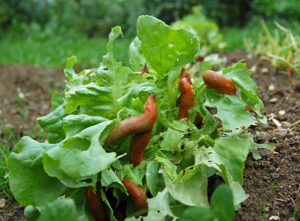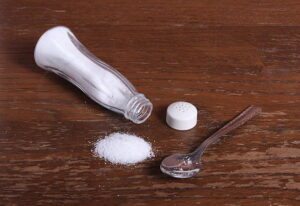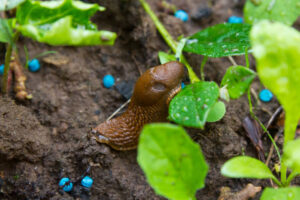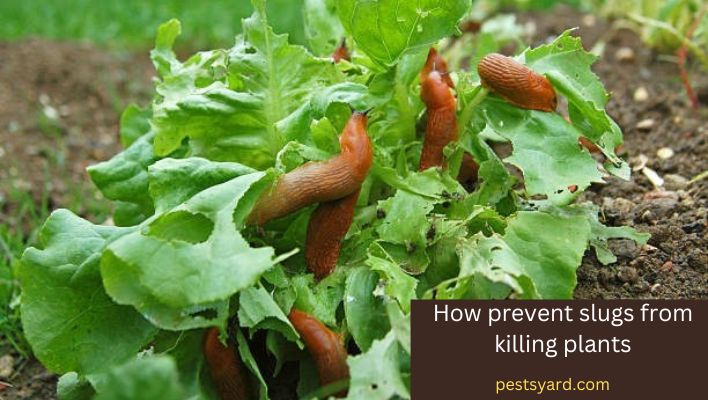You might be wondering if slugs can kill your plants. Because of the devastating effects they can have on your garden, this is a common question many people ask. Slugs will attack the stem and leaves of the plant, leaving a mess that can be difficult to clean up.
They munch on different plants, causing lots of damage that may eventually kill the plant when not controlled. They feed on tender plants like tomato plants and chilies, which are crucial for a healthy diet.
When these little critters grow their shell, it gives them another layer to protect from predators in their area. But what if you live around places where there are no natural predators? This can be detrimental if you don’t know how dangerous slugs can be to your garden.
Read on if you want to know whether slugs will kill your plants. We will break down and tell you what they can do to your plants, how their damage can be minimized or prevented, and then provide tips to prevent their presence on your property.
Slug will damage and kill your plants.
Slugs can be very destructive in your garden because they love to eat the leaves of plants. They can kill your plants, but it’s not their fault. Slugs are just doing what they’re supposed to: eat and reproduce. They are a natural part of any ecosystem, and as long as you have them in your garden in less abundance, you’re fine.
If you have too many slugs in your garden, they can cause problems for your plants. Some slugs are more of a hazard than others. The ones that can kill plants are the European slug (Limax maximus) and the common garden slug (Limax flavus).
These are the same species that can damage crops, but they don’t do it on purpose. Their populations are controlled naturally by predators and parasites, which keep their numbers under control. However, when those populations grow unchecked, they can wreak havoc on your garden. Here are the various ways to stop slugs from eating your plants.
The most common way this happens is when they eat your plants’ leaves and stems, which could cause them to die. Slugs prefer cool temperatures, so if you have a warm area in your yard, like under a deck or patio furniture, those may be areas where you’ll see more of these pests than others. The best way to prevent this problem is to make your garden unattractive to them.

Causes of Slug Infestation
Slug infestation is a big problem in many gardens, and there are many causes. The common cause of slug infestation is that there is too much moisture in your garden and the availability of food.
Slugs are attracted to damp areas, and the availability of food ad water will attract them to your garden. There are also other causes of slug infestation, include:
- Overwatering
- Improperly maintained lawns and gardens
- Unpracticed lawn care techniques
- Lack of adequate garden space
- Overuse of pesticides and fertilizers
Slugs are beneficial to your plants
You’ve probably heard that slugs can kill plants. But you might not know that they can help your plants in many ways, such as by controlling pests. Slugs are often touted as the most common culprit for plant damage, but this is primarily due to a misconception of what constitutes a slug and also because slugs are often seen as pests.
Slugs are beneficial to your garden; they feed on harmful insects and help prevent other pests from attacking your plants. They also are a good food source for many beneficial insects, birds, frogs, snakes, and toads. However, you must keep slugs population low to prevent them from damaging your plants.
In addition to eating pests, slugs can also act as an indicator of soil quality or pH levels in your soil. They will leave behind slime trails as they move around on the ground or in the air; if there’s something wrong with the soil’s chemical makeup or pH level (or if there isn’t enough water), slugs will be unable to move freely through it and may get stuck in place forever.

Can I put salt on my plants to kill slugs?
Salt is a great tool for killing slugs because it’s so effective and easy to use. You don’t need to find the slug; put it in a bucket of salt water and wait for it to die. You can sprinkle salt around your plant to protect your plants from slugs’ attacks.
Salt is also great because it’s safe for pets (as long as they’re not around) and won’t burn their skin or eyes. Salt is a natural slug-killer that will make the soil in your garden inhospitable for the creatures.
When you sprinkle salt on your plants, it will absorb moisture from the soil, making it more difficult for slugs to survive in your yard. When you pour salt on slugs, it kills them by dehydrating them.
You can use any salt; just make sure it’s not mixed with chemicals, which are harmful to some plants and animals.
Slugs are no match for salt, and it’s a great way to get rid of them quickly. You just need to be careful not to use too much, or the plants will be damaged. Ensure you’ve removed snails or slugs from your garden before sprinkling salt on them.
How prevent slugs from killing plants
Slugs can be a major problem for your plants, especially if they’re not being treated. The more slugs you have, the more damage they will do to your plants. Below are the various ways to kill and prevent slugs from getting eating your plants
Remove debris that can attract slugs.
Slugs are a threat to your plants, but they can be prevented. The most important step to prevent slugs from killing plants is to remove debris that attracts them. Debris includes:
- Leaves
- Grass clippings
- Soil
- Pollen and spores
You’ll want to remove any piles of leaves or other organic matter left around the base of your plants and any piles of compost near the base of your garden beds. The best way to do this is by using a shovel or rake and removing the debris in one area at a time.
Handpick slugs and snails and drown them
Slugs and snails can do a lot of damage to plants, particularly if they’re abundant. You can use handpicking as an initial step to reduce the number of slugs and snails on your property.
Watch out for them during their active hours, usually late in the evening or after it rains, to hunt them. Pick them and drown them in salty or vinegar solution, which will kill the slug immediately.
Use beer traps
Beer traps are a great way to prevent slugs from eating your plants. It is an effective way to get rid of slugs and snails that are eating your plants. They work by trapping the animal in a beer bottle. The slugs will drown in the beer with high alcohol content. The best part? It’s cheap, easy to make, and requires no special tools.
Beer traps can be made using empty bottles with holes drilled into them. Slugs can crawl through the holes and drown in beer. You can also use this method in conjunction with regular slug baits.
Slug bait pallets
Slug bait pallets are a great way to keep your garden safe from slugs without worrying about harming the environment or hurting yourself with toxic chemicals. You can use them anywhere around the garden where there’s potential for slug damage, but most people choose to use them in pots or planters near their garden beds, where slugs are likely to appear.

Once you’ve placed the pallets in your pots and planters, add some bait and wait. Slugs will find it irresistible, and no more worries about your precious plants getting eaten by these pesky animals.
Mulch
Mulch is just shredded bark or wood chips that you lay down around your plants, and it keeps the soil moist, which keeps slugs away. You can buy mulch at most home improvement stores in bags with instructions for use.
If you don’t have time to go out and buy some, make sure you have some shredded bark or wood chips on hand. It’s easy to do: just grab a handful of whatever kind of tree bark or wood chips you have, and shred it up into pieces small enough to fit into your compost bin (or even directly on top of your soil).
You can also try covering the bottom of your planter box with a layer of gravel or stones. This will help prevent slugs from crawling into your plants and eating them. Then put them around each plant by digging holes with your shovel until they are covered up completely.
Copper strips or tape
Slugs are a pain to deal with and can cause severe damage to your plants. The best way to stop slugs from killing plants is by using copper strips. Copper strips are available in various sizes, so you can find one that is right for your plant’s needs.
You may also want to consider using copper sulfate to keep slugs away from your plants if you don’t have access to copper strips. Slugs are repelled by the copper and will not go near it. This method also works well for other pests, so this will surely keep your garden free of pests.
Attract Predator
Predators are a good way to keep slug and snail populations under control. Predators can be birds, ducks, toads, frogs, or other animals that eat these pests. Birds are a natural choice for slug control because they are attracted to the same things that slugs like: shiny things and water.
You can also attract predators by installing bird feeders in your yard or hanging birdhouses around your garden area. If you have slugs in your garden, this will help keep them away by attracting more birds who will eat them.
Plant slug-resistant flowers, herbs, or vegetables
Slugs are a big problem for gardeners, especially if plants take up a lot of space. They can eat your plants’ leaves, flowers, and stems, causing them to die.
One way to prevent slugs from eating your plants is by planting slug-resistant flowers, herbs, or vegetables. These plants will deter slugs and attract other wildlife that will keep the slugs away from your plants. Some slugs-resistant plants you can grow include.
- Cilantro (Coriandrum sativum)
- Mint (Mentha spp.)
- Rosemary (Rosmarinus officinalis)
- Oregano (Origanum vulgare)
Remove hiding places
Slugs are a common pest that feeds on various plants, including roses, tomatoes, and other fruits and vegetables. Another good way to prevent slugs from damaging your plants is to remove their hiding places.
Make sure that any areas where slugs can hide are sealed off with wire mesh or other material so they cannot use it as a way to get access to your garden. This may include under mulch or in any holes or cracks in the soil.
You can also try using repellents such as garlic oil or slug bait pellets around vulnerable areas of your garden, such as under mulch or near plant stems where slugs might be hiding.
Sprinkle salt on them
To prevent slugs from killing your plants, you can use various methods. A good and simple method is spraying them with salt water or sprinkling them on them. Both methods will kill and prevent the slug from attacking your plants again.
Salt works as a deterrent because it’s a natural substance that the slug detests. So this method can be effective for small and large areas. However, you should be careful when using these methods because they can damage the garden if not used correctly.
Cut a citrus peel
Cut a citrus peel and place it in the garden. Slugs hate citrus peels because they contain citric acid, and they can’t digest them. Citrus peels have a high concentration of citric acid, making them a natural slug repellent.
They can be used to deter slugs from climbing up your citrus trees and eating their leaves, but they can also be used as an insecticide on other plants. This is a natural, non-toxic way to repel slugs and snails. The citrus peel will also attract parasitic wasps that are known to kill slugs.
This will keep slug numbers down so you can enjoy your favorite plants without worrying about them getting eaten by slugs every time. Slugs will avoid the area when you cut a citrus peel and put it on your plants.
Eggshells
Eggshells are a natural and effective way to prevent slugs and snails from eating your plants. The shells act as an abrasive, which can help to kill the slug or snail. Place the eggshells around the base of your plants, and they should be able to deter slugs from nibbling on them.
Diatomaceous Earth
One of the best ways to prevent slugs from killing your plants is to ensure that the area around your plants is free of snail shells, snails, and slugs.
You can do this by sprinkling diatomaceous earth around the base of your plants. The diatomaceous earth will kill any slugs that try to crawl into your garden. It also works as a fertilizer for your plants.
